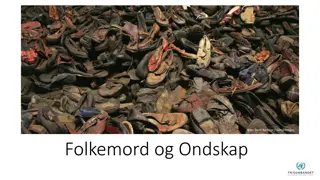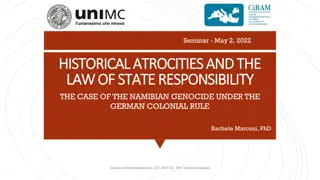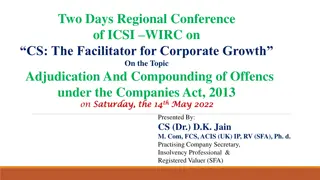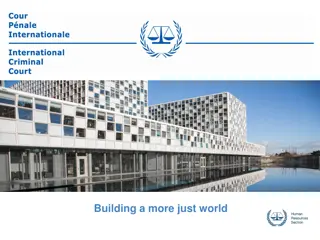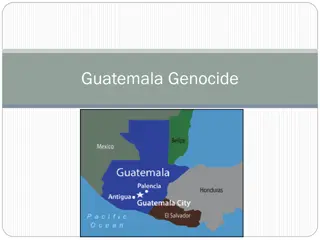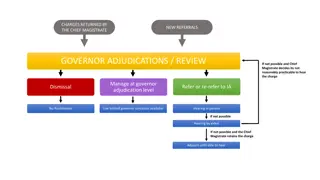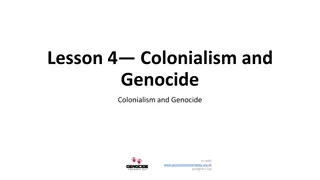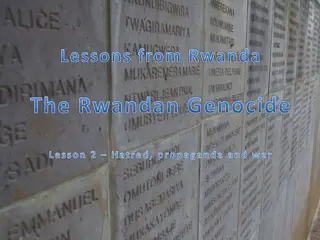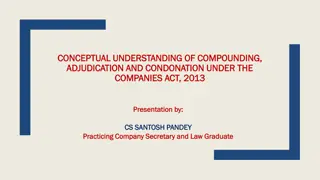Overview of ICTY's Adjudication of Crimes Against Humanity and Genocide
Explore the significant role of the International Criminal Tribunal for the former Yugoslavia (ICTY) in adjudicating crimes against humanity and genocide, focusing on the history, international crimes, specific trials, and achievements in bringing perpetrators to justice. The presentation provides insights into the ICTY's mission to address atrocities in the Balkan region, contributing to lasting peace and accountability.
Uploaded on Sep 29, 2024 | 5 Views
Download Presentation

Please find below an Image/Link to download the presentation.
The content on the website is provided AS IS for your information and personal use only. It may not be sold, licensed, or shared on other websites without obtaining consent from the author.If you encounter any issues during the download, it is possible that the publisher has removed the file from their server.
You are allowed to download the files provided on this website for personal or commercial use, subject to the condition that they are used lawfully. All files are the property of their respective owners.
The content on the website is provided AS IS for your information and personal use only. It may not be sold, licensed, or shared on other websites without obtaining consent from the author.
E N D
Presentation Transcript
The practice of the ICTY in adjudicating crimes against humanity & genocide Special overview of genocide in the Municipalities April 2016 Lauranne Duffaut, Associate Legal Officer, ICTY
Plan of the presentation 1. Short history of the ICTY 2. International crimes 3. Adjudicating CAH and genocide 4. Genocide in the Karad i Trial Judgement 5. Q&A
History of the ICTY UN SC Resolution 827 of 25 May 1993 => ICTY UN SC Resolution 955 of 8 November 1994 => ICTR UN SC Resolution 1966 of 22 December 2010 => MICT
History of the ICTY Crimes in Bosnia and Herzegovina constituted a threat to international peace and security. The ICTY was thus to bring perpetrators to trial, deter future crimes and render justice to victims and their families, thus contributing to a lasting peace in the former Yugoslavia.
Crimes against humanity The Charter of the Nuremberg Tribunal (1945) CAH the Tribunal could try were defined as: murder, extermination, enslavement, deportation, and other inhumane acts committed against any civilian population, before or during the war, or persecutions on political, racial, or religious grounds, in execution of or connexion with any crimes within the jurisdiction of the Tribunal [ie either crimes against peace or war crimes ], whether or not in violation of the domestic law of the country where perpetrated. CAH include all actions contrary to the quality of being humane. CAH were made punishable even if perpetrated in accordance with domestic laws.
Crimes against humanity Subsequent developments December 1946: the UN GA unanimously affirmed the Nuremberg principles. Customary international law does not require CAH to be linked to a war. However, some instruments still do for instance, the ICTY Statute.
International crimes: Genocide Evolution of the notion 1944: Polish lawyer R. Lemkin first coins the word genocide . 1948: In the Greifelt and others case, genocide isused to describe the criminal conduct of Nazis. All cases heard by US Military Tribunals: killing of Jews in concentration camps are defined as a war crime or a crime against humanity.
Genocide The Genocide Convention and its interpretation 1948: UN General Assembly adopted the Genocide Convention. Article II of the Genocide Convention provides: In the present Convention, genocide means any of the following acts committed with intent to destroy, in whole or in part, a national, ethnical, racial or religious group, as such: (a) Killing members of the group; (b) Causing serious bodily or mental harm to members of the group; (c) Deliberately inflicting on the group conditions of life calculated to bring about its physical destruction in whole or in part; (d) Imposing measures intended to prevent births within the group; (e) Forcibly transferring children of the group to another group.
Genocide Subsequent developments 1951: ICJ Advisory Opinion on Reservation to the Convention on Genocide -- confirmed in the Court s 2007 Judgement Bosnia and Herzegovina v. Serbia. 1961: District Court of Jerusalem hears the Eichmann case -- appealed before the Supreme Court of Israel. 1993-1994: ICTY / ICTR cases. 1997: genocide is brought before the Higher State Court of Dusseldorf through the Jorgi case.
Adjudicating CAH Definition & constituting elements Certain acts that are committed as part of a widespread or systematic attack directed against any civilian or an identifiable part of a population. Art. 5 of the ICTY Statute
Crimes against humanity Elements of CAH Objective elements: (1) must be of extreme gravity and be part of a practice, (2) be targeted against the civilian population. Subjective elements: (1) the mens rea proper or intent to commit the underlying offence, (2) the awareness of the existence of a widespread or systematic practice.
Adjudicating Genocide Definition & constituting elements Deliberate killing of a large group of people, especially those of a particular nation or ethnic group. Art. 4(2) of the ICTY Statute.
Genocide Elements of genocide Objective elements: (a) Killing; (b) Causing serious bodily or mental harm; (c) Deliberately inflicting conditions of life; (d) Imposing measures to prevent births; (e) Forcibly transferring children; (?) Ethnic cleansing . Subjective elements: (1) the mens rea proper to commit the underlying offence, (2) genocidal intent. Genocidal intent: intent to destroy in whole or in part one of the groups enumerated in the convention (national, ethnical, racial or religious) .
Important cases Radislav Krsti : First judgement affirming genocide. August 2001, TC convicted of genocide, crimes against humanity and violations of the laws or customs of war. April 2004, AC convicted of aiding and abetting genocide, crimes against humanity and violations of the laws or customs of war.
Important cases Vujadin Popovi et al.: Largest case re. Srebrenica. June 2010, TC convicted of genocide, crimes against humanity, and violations of the laws or customs of war. January 2015, AC convicted of genocide, conspiracy to commit genocide, crimes against humanity, and violations of the laws or customs of war.
Important cases Zdravko Tolimir: Latest case before re. Srebrenica. December 2012, TC convicted of genocide, conspiracy to commit genocide, crimes against humanity, and violations of the laws or customs of war. April 2015, AC convicted of genocide, conspiracy to commit genocide, crimes against humanity, and violations of the laws or customs of war.
Genocide in the Karadi case Background July 1990 -July 1996: President of the Serbian Democratic Party (SDS) & President of the National Security Council of the Republika Srpska. May 1992: President of the Presidency of Republika Srpska. December 1992: sole President and Supreme Commander of the armed forces of Republika Srpska.
Karadi case Charges 11 counts: 2 of genocide, 5 of CAH, and 4 of violations of the laws or customs of war. Participation in 4 JCE s: Permanently remove Bosnian Muslims and Bosnian Croats from Bosnian Serb-claimed territory in BiH; Campaign of sniping and shelling against the civilian population of Sarajevo in order to spread terror; Take hostage over 200 UN peacekeepers and military observers; Eliminate the Bosnian Muslims in Srebrenica.
Karadi case Genocide in the Municipalities Objective element Para. 2572, TJ: summary of the 98bis proceedings Paras 2579, 2582, TJ: conditions for the actus reus were met for the killing and bodily/mental harm caused to Bosnian Muslims in the Municipalities Para. 2587, TJ: conditions for the actus reus were NOT met for the slow death crimes Subjective element Para. 2624, TJ: no intent to destroy -> rather, intent to change the ethnic composition of the municipalities
Karadi case Genocide in Srebrenica Objective element Para. 5660, TJ: at least 5,115 Bosnian Muslim males were killed Para. 5665, TJ: thousands of Bosnian Muslim males and females were subjected to serious bodily or mental harm Subjective element Para. 5671, TJ: Bosnian serbs tried to kill every able-bodied Bosnian Muslim male from Srebrenica AND almost simultaneously removed the remainder of the population Para. 5673, TJ: there was an intent to commit genocide
Karadi case Karad i s criminal responsibility Individual responsibilty: para. 5849, TJ Superior responsibility: para. 5850, TJ Conclusion: Karad i was held criminally responsible under Art. 7(1) and 7(3) of the ICTY Statute and sentenced to 40 years imprisonment.
Q&A Thank you for your attention! Any questions!?
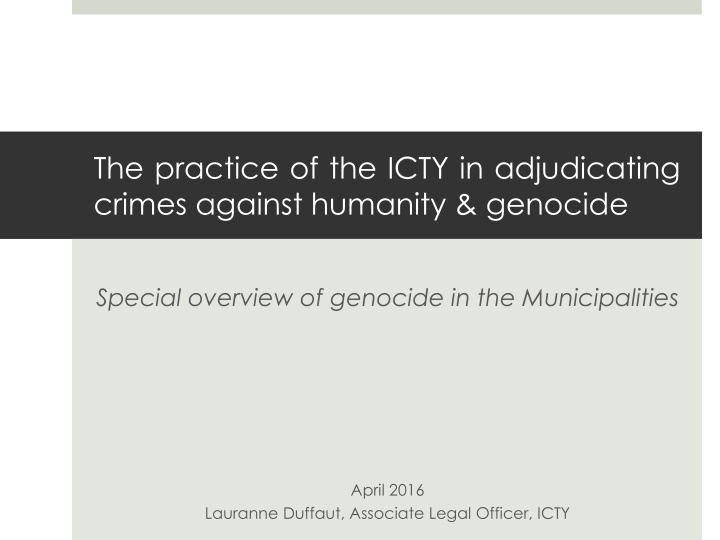

![Prevention and Combating of Hate Crimes and Hate Speech Bill [B.9B.2018]](/thumb/60513/prevention-and-combating-of-hate-crimes-and-hate-speech-bill-b-9b-2018.jpg)
